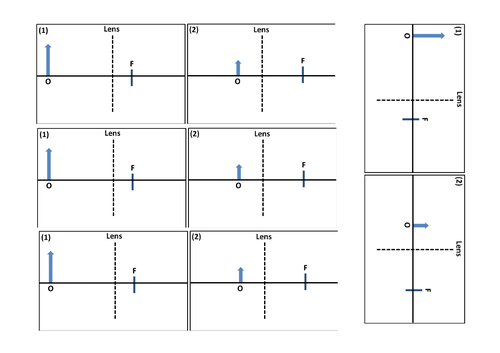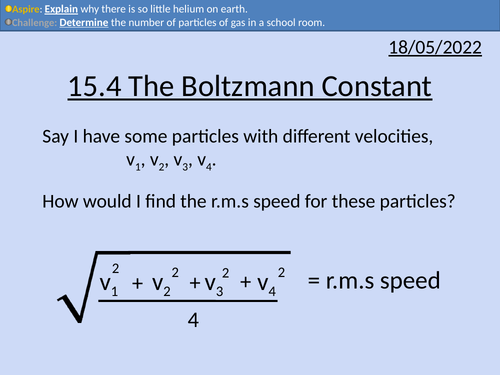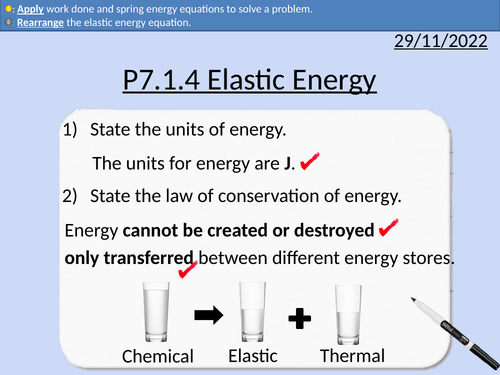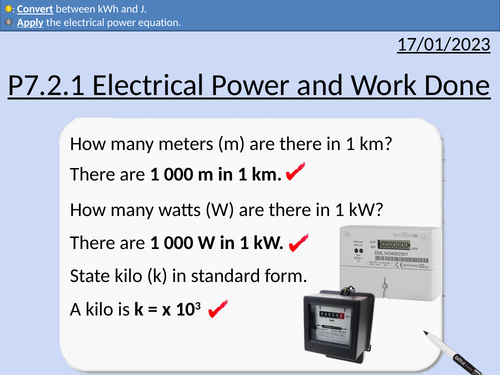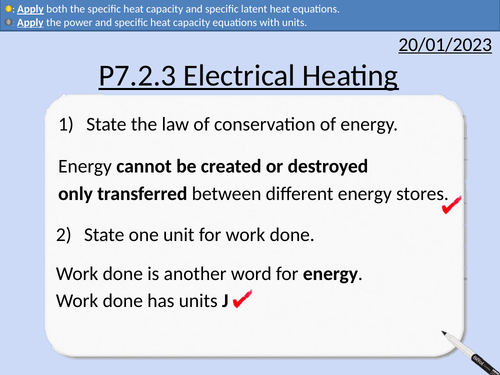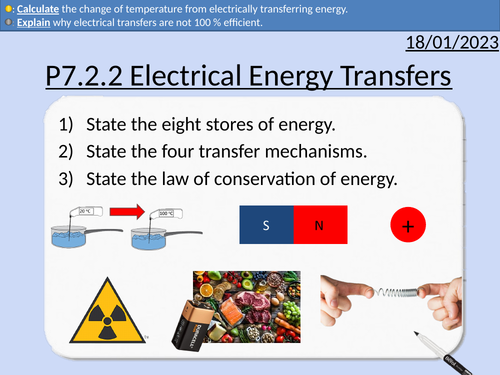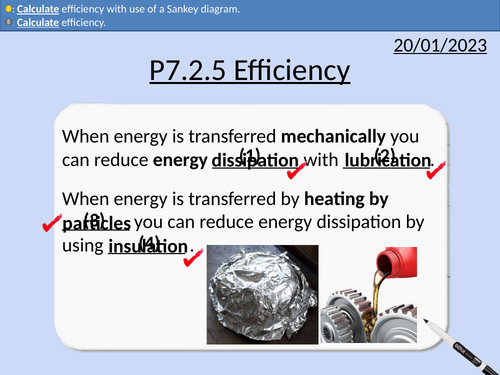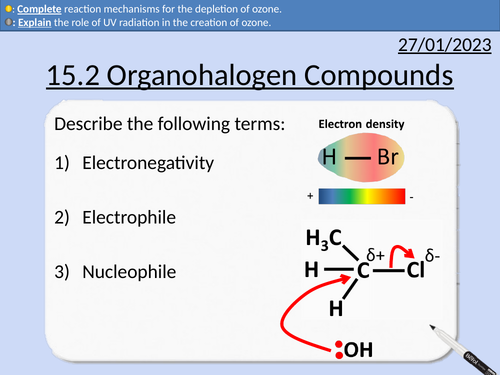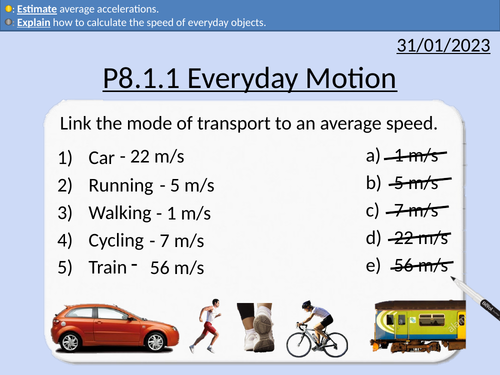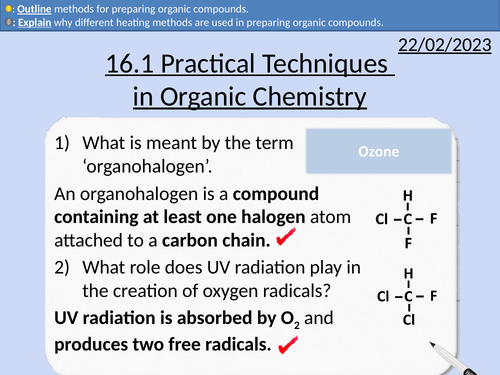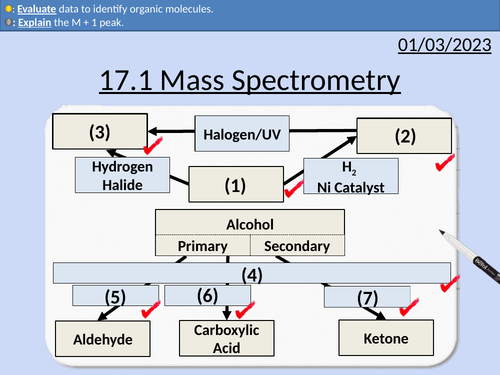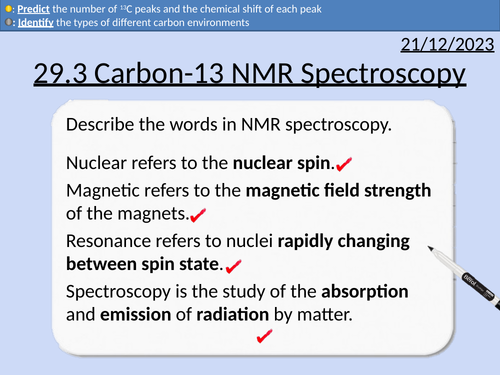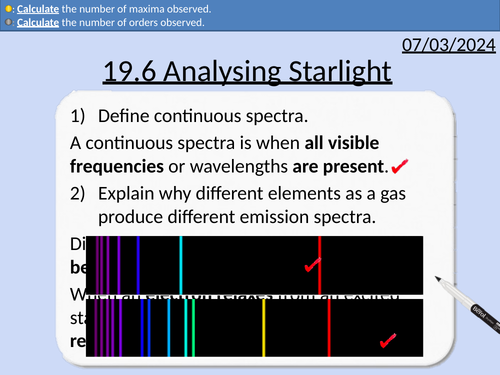500Uploads
172k+Views
73k+Downloads
All resources

GCSE Physics: Wave Velocity
This presentation covers OCR Gateway Physics 9-1 P5.1.2 Wave Velocity.
Includes student activities and full worked answers.
Simple experiment for the speed of sound
Speed of sound experiment with microphones and oscilloscope.
Ripple tank demonstration and explanation
The speed equation
Measuring distance and time
Echoes
Definition of mechanical waves
Water waves as a transverse waves
Converting from cm, mm, and km into m.
Definition and equation for frequency.
Wave speed equation

GCSE Physics: Lenses
This presentation covers OCR Gateway Physics 9-1 P5.3.2
Includes student activities and full worked answers.
Convex and Concaves lenses
Eyes and corrective lenses
Refraction and wavelength
Focal points for lenses
Determining the type of images produced through a lens

OCR A level Physics: Internal Energy
OCR A level Physics: Internal Energy is a part of the Module 5: Newtonian World and Astrophysics. The PowerPoint presentation includes worked examples, solutions and a homework.

OCR A Level Physics: The Boltzmann constant
OCR A Level Physics: The Boltzmann constant presentation with homework and answers

GCSE Physics: Work Done and Elastic Energy
This presentation covers OCR Gateway Physics 9-1 P7.1.4 Work Done and Spring Energy.
Use of Springs
Measuring Extension of a Spring
Rearranging Spring Energy Equation
Rearranging Kinetic Energy Equation
Practice Questions with Worked Solutions
Bundle

OCR AS level Chemistry: Alkenes
OCR AS level Chemistry: Alkenes is apart of the Module 4: Core Organic Chemistry and Analysis
All presentations come with worked examples, solutions and homeworks
Comparing pi-bond (π-bond) and sigma bonds (σ-bonds).
Aliphatic alkenes and alicyclic arrangements of molecules
s, p, d orbitals for electrons
Trigonal planar shape of alkanes leading to 120 degree bond angle.
E/Z isomerism
Conditions for trans- and cis- isomerism
Cahn-Ingold-Prelog rules and priority ordering
Alkene addition reactions:
Hydrogen with a nickel catalyst
Halogens
Hydrogen halide
Steam with an acid catalyst
Test for unsaturated alkenes.
Bond enthalpy for sigma and pi bonds.
Electrophile molecules
Electronegativity
Reaction mechanisms for addition reaction of alkenes and hydrogen halides
Carbocations and stability
Markownikoff’s Rule
Monomers and repeat units
Addition Polymerisation for:
Polyethene
Polypropene
Polylactate
Polystyrene
Polyvinyl Chloride (PVC)
Environmental Concerns from polymers including:
Combustion of polymers
recycling PVC
biogradeable bioplastics
photodegradable polymers
feedstock recycling

GCSE Physics: Electrical Power and Work Done
This presentation covers OCR Gateway Physics 9-1 P7.2.1 Electrical Power and Work Done. All presentations come with student activities and worked solutions.
Definition of power
Converting between W and kW
Converting between seconds, minutes, and hours
Calculating work done in kWh and J
Converting between kWh and J

GCSE Physics: Electrical Heating
This presentation covers OCR Gateway Physics 9-1 P7.2.3 Electrical Heating Transfers. All presentations come with student activities and worked solutions.
Walls and Insulation
Thermal energy dissipation
Reducing thermal energy dissipation with lubrication and insulation
Heating substances and state changes
Work done = Power x Time
Change in thermal energy = Mass x Specific Heat Capacity x Change in temperature
Thermal energy for state change = Mass x Specific latent heat

GCSE Physics: Electrical Energy Transfers
This presentation covers OCR Gateway Physics 9-1 P7.2.2 Electrical Energy Transfers. All presentations come with student activities and worked solutions.
Energy stores
Energy transfers
Current heats wires
Wasted energy in motors and heating elements
Specific heat capacity and electrical energy
Thermal energy = Mass x Specific Heat Capacity x Change in Temperature
Energy = Charge x Potential Difference
Bundle

OCR AS level Chemistry: Haloalkanes
OCR AS level Chemistry: Haloalkanes is apart of the Module 4: Core Organic Chemistry and Analysis
All presentations come with worked examples, solutions and homeworks
Naming Haloalkanes
Classifying Haloalkanes (primary, secondary, tertiary)
Electronegativity
Reaction mechanism for hydrolysis
Rates of reactions for hydrolysis
Reaction conditions for hydrolysis
Definitions for CFC (Chlorofluorocarbons) and HCFC (Hydachlorofluorocarbons)
Creation of ozone
Depletion of ozone with CFCs
Reaction steps including initiations and propagation

GCSE Physics: Efficiency
This presentation covers OCR Gateway Physics 9-1 P7.2.5 Efficiency.
All presentations come with student activities and worked solutions.
Efficiency Ratings
Improving efficiency with insulation and lubrication
Maximum efficiency
Efficiency equation
Sankey diagrams

OCR AS Chemistry: Organohalogen Compounds
OCR AS Chemistry: 15.2 Organohalogen Compounds and the Environment
This PowerPoint is a whole lessons included with student activities, animated answers, homework questions with answers provided.
This lesson covers:
Definitions for CFC (Chlorofluorocarbons) and HCFC (Hydachlorofluorocarbons)
Creation of ozone
Depletion of ozone with CFCs
Reaction steps including initiations and propagation

GCSE Physics: Everyday Motion
This presentation covers OCR Gateway Physics 9-1 P8.1.1 Everyday Motion. All presentations come with student activities and worked solutions.
Average speeds of walking, running, cycling, cars, trains, wind, sound, and light.
The speed equation
The acceleration equation
Explaining average speed camera
Explaining instantaneous speed camera
Estimating everyday accelerations
Calculating speed from rotation speed and circumference of wheels
Converting from miles per hour to meters per second

GCSE Physics: Forces in Collisions
This presentation covers OCR Gateway Physics 9-1 P8.1.4 Forces in Collisions. All presentations come with student activities and worked solutions.
Large accelerations produce large forces.
Values of g that cause severe injury or death
Road Safety
Newton’s First Law and seat belts
Crumple zones
Force = Mass x Acceleration
Acceleration = Change in velocity /Time taken
Estimating speed, accelerations and forces involved in large accelerations for everyday road transport.

OCR AS Chemistry: Practical Techniques in Organic Chemistry
OCR AS Chemistry: 16.1 Practical Techniques in Organic Chemistry
This PowerPoint is a whole lessons included with student activities, animated answers, homework questions with answers provided.
This lesson covers:
Heating under reflux
Distillation
Re-distillation
Purifying Organic Products
Removing impure acids from organic compounds
Drying agents

OCR AS Chemistry: 17.1 Mass Spectrometry
OCR AS Chemistry: 17.1 Mass Spectrometry
This PowerPoint is a whole lessons included with student activities, animated answers, homework questions with answers provided.
This lesson covers:
Molecular ions M+
M + 1 peak
Fragment ions
Identifying molecules from a mass spectrum
Bundle

OCR AS Chemistry: Module 4 Organic Chemistry
This bundle includes all PowerPoint lessons for Module 4 Organic Chemistry.
All PowerPoints are whole lessons included with student activities, animated answers, homework questions with answers provided.
Basic concepts of organic chemistry
Organic Chemistry
Nomenclature of organic compounds
Representing the formulae of organic compounds
Isomerism
Introduction to reaction mechanisms
Alkanes
Properties of the alkanes
Chemical reactions of the alkanes
Alkenes
Properties of the alkenes
Stereoisomerism
Reactions of alkenes
Electrophilic addition in alkenes
Polymerisation in alkenes
Alcohols
Properties of alcohols
Reactions of alcohols
Haloalkanes
The chemistry of haloalkanes
Organohalogen compounds in the environment
Organic Synthesis
Practical techniques in organic chemistry
Synthetic routes
Spectroscopy
Mass spectrometry
Infrared spectroscopy

A level Chemistry: Carbon-13 NMR Spectroscopy
OCR A level Chemistry: 29.3 Carbon-13 NMR Spectroscopyy
This PowerPoint is a whole lesson included with student activities, animated answers, homework questions with answers provided.
This lesson covers:
Identifying different carbon environments
The types of carbon environment
The amount of chemical shift ẟ / ppm

OCR A level Physics: Analysing Starlight
OCR A level Physics: 19.6 Analysing Starlight
Module 5 Newtonian World and Astrophysics
This PowerPoint is a whole lesson included with student activities, animated answers, homework questions with answers provided.
This lesson covers:
Electromagnetic interference
Double slit experiment
Path and phase difference
Diffraction grating
The grating equation
Lines per millimeter to grating spacing
Maximum order, n
Maximum number of maxima

GCSE OCR Physics 9-1 Paper 1 Revision Booklets
OCR GCSE Physics Paper 1 for higher tier (triple and combined) are covered with individual revision booklets.
Each booklet has:
Link to specification number
Denotes if it is higher or combined material
Equations to recall and apply for that section
Equations to apply for that section
Key Points
Exam questions
Mark Schemes for each question
Triple Booklets:
P1.1 The Particle Model
P1.2 Changes of State
P1.3 Pressure
P2.1 Motion
P2.2 Newton’s Laws
P2.3 Forces in action - Simple Machines
P2.3 Forces in action - Springs and Gravitational Energy
P3.1/2 Electricity
P4.1 Magnetism
P4.2 Uses of Magnetism
Combined Booklets:
P1.1 The Particle Model
P1.2 Changes of State
P2.1 Motion
P2.2 Newton’s Laws
P2.3 Forces in action - Springs and Gravitational Energy
P3.1/2 Electricity
P3.3 Magnetism and Fields


